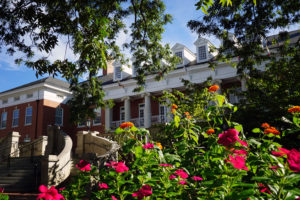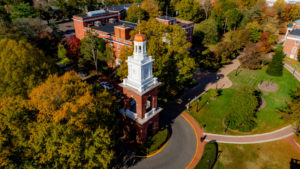Formal sustainability committee? Check.
Environmentally focused degrees? Check.
LEED-certified buildings? Check.

A host of Earth-friendly initiatives has earned the University of Mary Washington a spot among the nation’s most environmentally responsible schools in the 2022 Guide to Green Colleges, published last week by The Princeton Review.
“UMW offers excellent academics and demonstrates a commitment to sustainability that is exemplary on many counts,” said Princeton Review Editor-in-Chief Rob Franek. “We strongly recommend the University of Mary Washington to students who care about the environment and want to study and live at a green college.”
More and more students are looking for that kind of experience, according to the education services company’s 2021 survey. Of more than 11,000 college applicants questioned, 78 percent – up 12 percent from the previous year – said a school’s gusto for going green would weigh into their college search.
“It isn’t unusual for students who have an interest in that element of their future – and the future of the planet – to choose a school specifically focused on the environment,” said UMW Director of Landscape and Grounds Holly Chichester. “That’s the kind of student we’re trying to attract here at Mary Washington.”
Of the thousands of U.S. institutions of higher education, 420 are included in the guide, which considers schools’ quality of campus life; ability to prepare students for employment in a 21st-century, clean-energy world; and environmentally responsible policies. On a scale of 60 to 99 for included colleges, UMW earned an 86 for its ecological elements, from sustainability learning outcomes to local and organic food service.
Created in 2009, Mary Washington’s President’s Council on Sustainability informs and advises University leadership on managing resources to meet current campus community needs while also reducing future environmental impacts. UMW took another significant step toward protecting the planet this fall by hiring its first official full-time sustainability coordinator. Charged with tying together eco-focused campaigns, from academic programs to waste-reduction initiatives, Sean Morrow started in October during Campus Sustainability Month.
“Exceptional students have carried the flag,” Chichester said of the role, formerly held by a rotation of student workers. “Now we’ll be able to advance forward exponentially.”

UMW programs – among them majors in environmental and natural science, and conservation biology, and a minor in environmental sustainability – offer hands-on learning experiences at places like the Smithsonian Conservation Biology Institute in Front Royal. Students volunteer with community partners like Tree Fredericksburg, Fossil Free Fredericksburg and Friends of the Rappahannock, and promote Earth-friendly practices, like recycling, gardening and bike-sharing.
Recognized by the Arbor Day Foundation as a Tree Campus USA, UMW is abuzz with pollinator gardens, a “no-mow” meadow and “bee hotels.” Following suit are campus buildings – the University has pledged a commitment to LEED silver standards – and Campus Dining, which received a “Virginia Green” designation.
“I think it’s important for institutes of higher education to be environmentally conscious because … young people will ultimately be making these decisions,” said senior conservation biology major William Olson, president of Mary Washington’s ecology club. “There’s a lot of enthusiasm for sustainability at UMW.”